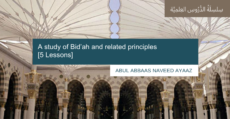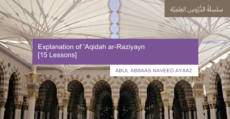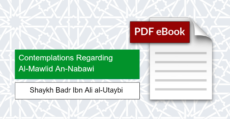In the name of Allāh, all praise is due to Him, and peace and blessings be upon the best of mankind, our Prophet Muhammad ﷺ.
Due to the absence of authentic evidence, those who innovate in religion often employ various methods to justify their practices. One common method is selectively quoting the statements of scholars. Recently, an image has circulated, selectively quoting Ibn Taymiyyah, in which he supposedly challenges the ‘Wahhābīs’ to “At least listen to your leaders.”
Even more strange is that those who spread it would seek to quote the words of Ibn Taymiyyah, for his opposition to the sufis and their likes, and their innovations, is known.
Below is a translation of Ibn Taymiyyah’s words, followed by points of benefit from his speech.
He stated in his book Iqtidā’ aṣ-Ṣirāṭ al-Mustaqīm, under the chapter ‘Innovated Festival Periods – Taking the Birthday of the Prophet ﷺ as an Eid, Emulating the Christians in the Celebration of the Birthday of ‘Īsā (ʿalayhi al-salām):
“…Likewise, what some people have innovated: either emulating the Christians in celebrating the birth of ‘Īsā (ʿalayhi al-salām), or out of love for the Prophet ﷺ and reverence for him. Allāh may reward them for this love and effort, but not for the innovations – such as taking the Prophet’s ﷺ Mawlid as an Eid. People differ regarding his birth, yet the early generations did not do this, despite having the means and no obstacle to do so if it had been good. And if this were truly a pure or preferable good, the early generations (may Allāh be pleased with them) would have been more entitled to it than us, for they were more devoted in love and reverence for the Messenger of Allah ﷺ, and more keen on pursuing good.
Indeed, the perfection of one’s love and reverence for him (the Prophet ﷺ) lies in following him, obeying him, adhering to his commands, reviving his Sunnah inwardly and outwardly, spreading what he was sent with, and striving for it with one’s heart, hand, and tongue. This was the way of the early generations—the Muhājirūn and Anṣār, and those who followed them in excellence.
However, most of those who are zealous about such innovations, despite their good intentions and efforts—which may earn them reward—are often negligent regarding the Prophet’s ﷺ commands in areas they were meant to be active. They are like one who adorns the Mushaf but does not recite it, or recites it but does not follow it; like one who decorates the mosque but does not pray in it, or prays little in it; like one who uses decorative beads and prayer rugs, and other such visible embellishments that were not legislated, often accompanied by ostentation and pride, and preoccupation with the unprescribed, which spoils the state of its doer. As the ḥadīth mentions: ‘The deeds of a nation are never corrupted except that they decorate their mosques.’
Know that some acts contain good because they include aspects of what is prescribed, yet also contain evil, such as innovations or other impermissible elements, making the overall act good due to what it includes of good, and evil due to what it contains of turning away from the religion in its entirety – such is the state of the hypocrites and disobedient people. This is what most of the Ummah has been afflicted by in the later times…” [to the end of the Chapter]
Points of Benefit from Ibn Taymiyyah:
- Ibn Taymiyyah wrote the above words under the chapter: ‘Innovated Festival Periods.’ This clearly shows that he considered the Mawlid to be a bid’ah (innovation) and not a sunnah. He compared it to the action of the Christians towards ‘Īsā (ʿalayhi al-salām).
- Those who misinterpret his words are selective in what they quote – they conceal his statement, which is clear, whereby he labelled the Mawlid as an innovation and clarified that nobody from among the pious generations celebrated it, even though they could have done it and nothing was preventing them.
- Those who celebrate the Mawlid are ignorant about its nature i.e. that it is a bid’ah, and they might be rewarded for their good intention of loving the Prophet ﷺ – not the innovated act of the Mawlid.
- True love and devotion to the Prophet ﷺ is demonstrated through following his Sunnah, reviving it and spreading it among the people
- Those who are eager for such innovations are often weak in following the established Sunnah of the Prophet ﷺ.
- The example of such people is like one who adorns a copy of the Qur’ān yet never reads it.
- An action may have some reward and also some punishment in it. The reward is for any good in it (like the intention of loving the Prophet ﷺ), as well as the sin and punishment for the evil in it (due to the actual innovation of the mawlid).
Conclusion
It can be concluded from the words of Ibn Taymiyyah that he disapproves of the innovated Mawlid and the possible reward he mentioned is only for the intention of an ignorant person in loving the Prophet – and not the actual action of the Mawlid, which is sinful and therefore punishable. This is in line with the Shari’i principle of an ignorant person being excused.
Finally, it is important to note, had Ibn Taymiyyah actually approved of the Mawlid, the other scholars of Ahl as-Sunnah would have also disapproved of his statement, as the Sunnah is more beloved to us than any individual.
I ask Allāh to guide the ignorant to the sunnah of sis Messenger ﷺ.
O Allāh, we ask you beneficial knowledge, righteous actions and lawful provision.
May salutations of praise and peace be upon the Prophet, his family, companions and all those who follow his guidance.
Written by:
Abul Abbaas Naveed Ayaaz
7th Rabi’ al-Awwal 1435h, corresponding to 8th January 2014
Nelson, Lancashire.






